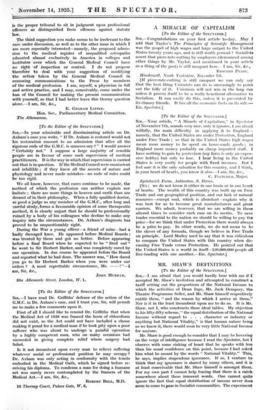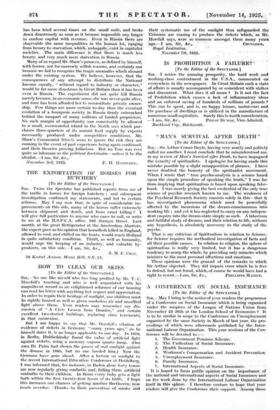MR. SHAW'S DEFINITIONS
[To the Editor of the SPECTATOR.] am afraid that you would hardly bear with me if I accepted Mr. Shaw's invitation and attempted to construct a tariff setting out the proportions of the National Income to which the activities of Dean Inge, Mr. Jack Dempsey, the Theatre Programme Seller, and Mr. Shaw himself respectively entitle them, "and the reason by which I arrive at them.',' Nor is it in the least incumbent upon me to do so. It is Mr. Shaw, not I, who constructs these ideal tables. My objection to his fifty-fifty scheme, "the equal distribution of the National Income without regard to . . . character or industry or anything but National Vitality," is that human nature being as we know it, there would soon be very little National Income for anyone.
Mr. Shaw is good enough to consider that I may be hovering on the verge of intelligence because I read the Spectator, but I observe with some sinking of heart that he speaks with less than his usual confidence on this point, because I had asked him what he meant by the words "National Vitality." This, he says, implies stupendous ignorance. If so, I venture to think that my ignorance is shared by many others, and it is at least conceivable that Mr. Shaw himself is amongst them. For my own part I cannot help fearing that there is a catch somewhere about these innocent words. One cannot quite ignore the fact that equal distribution of income never does seem to come to pass in Socialist communities. The experiment has been _tried several times on the small scale, and broke down disastrously as soon as it became impossible any. longer to confuse capital with revenue. Even in ,Itiissia there are observable the same inequalities in the human lot, ,ranging from luxury-to starvation, whicliUnhapriily,-exist In capitalist societies. The main differenee is that There is much less luxury, and very much more starvation in Russia.
Many of us regard Mr. Shaw's panacea, as defined by himself, with horror, not for narrowly selfish reasons, and certainly not because we fail to recognize the tragic anomalies which abound under the existing system. We believe, however, that the consequences of any attempt to distribute the National Income equally, "without regard to industry or character," would be far more disastrous in Great Britain than it has been even in Russia. The experinient did not quite kill Russia merely because, in an economic sense, she was never quite alive, and time has been afforded her to reconstitute private owner- ship. Few things are more certain to-day than the eventual evolution of a bourgeois society in Russia firmly entrenched behind the rampart of many millions of landed proprietors. No such margin of opportunity can conceivably be allowed to a small, overcrowded island in the North seas which pur- chases three-quarters of its annual food supply by exports necessarily produced under competitive conditions. Mr. Shaw's Communist friends seem to ignore the risk they are running in the event of past experience being again confirmed, and their theories proving fallacious. But no Tsar was ever quite so inhuman as the political doctrinaire—unless it be the idealist.—I am, Sir, &c.,



























































 Previous page
Previous page